Tim Jones's Blog, page 23
November 9, 2013
I Can't Give You Anything But Time

Viv Albertine (The Slits), Keith Levene (PIL) and Mick Jones (The Clash), 1976

Mick Jones and Viv Albertine, 2013
Mick sings about Viv: "Train in Vain" - lyrics
Viv sings about home: "Confessions of a MILF" - lyrics
Mick Jones plays guitar on the studio version of "Confessions of a MILF", from Viv Albertine's recent solo album The Vermilion Border.
Viv Albertine stars (with Liam Gillick and Tom Hiddleston) in Joanna Hogg's new film Exhibition, and her memoir Clothes Clothes Clothes Music Music Music Boys Boys Boys is scheduled for publication in 2014.You can buy books by Tim Jones online! Voyagers: SF Poetry from NZ from Amazon.Transported (short story collection) from Fishpond or New Zealand Books Abroad.

Published on November 09, 2013 02:55
November 4, 2013
Tuesday Poem: The Johnsonville Volcano
The sea has flooded Lambton Quay,
turned buses into hydrofoils.
A subtle charcoal pinstripe is all the rage
in this year's range of swimsuits for officials.
The Johnsonville Volcano erupted on Saturday,
turning three prime retail outlets into slag.
Brave shoppers, risking a fiery death,
shepherded whiteware to safety.
Blame isostatic rebound. Blame white elephants
and their love of motorway construction.
We’ve learned that indoor sports centres
readily convert to swimming pools.
We’ve learned that nature doesn't stuff around.
Wear something light and ash-resistant.
Get on the road early. Fit asbestos tyres
to the wheels of your asbestos car.
Credit Note: This is one of three new poems by me that are included in JAAM 31, the 2013 issue of JAAM magazine, which has just been published and will be launched in a couple of weeks. They are the first new poems I'd written in quite a while, so I'm very pleased to see them in print. It looks like a great issue.
Tim says: A little scientific note: "isostatic rebound" is the rise of land masses that were depressed by the huge weight of ice sheets during the last glacial period - but in this poem, I'm thinking of Antarctica rising as the ice sheets slough off due to climate change, and its proposed consequence of increased volcanic activity.
The Tuesday Poem: Has not maintained a silence.
You can buy books by Tim Jones online! Voyagers: SF Poetry from NZ from Amazon.Transported (short story collection) from Fishpond or New Zealand Books Abroad.

Published on November 04, 2013 11:42
October 29, 2013
Maybe Modern Life Isn't Rubbish After All: George R. R. Martin's "A Song of Ice and Fire"
Over the past month-and-a-half, I have read the five volumes published to date of George R. R. Martin's projected seven-volume series A Song of Ice and Fire, also known as the source material for the HBO series Game of Thrones. Here are my ratings for the individual volumes (via LibraryThing):
A Game of Thrones - 4.5/5
A Clash of Kings - 4/5
A Storm of Swords - 4.5/5
A Feast for Crows- 3.5/5
A Dance with Dragons - 4/5
Note: The following discussion ranges across all five books, and thus contains some spoilers for those who have not read that far - but it's not primarily a discussion of the books' plot.
These are very long books, and the TV series being made from them, Game of Thrones, will probably run to 80 or 90 hours of television by the time [FAKE SPOILER ALERT...] Ramsey Bolton, Euron Greyjoy and Lady Stoneheart take their rightful places as the three heads of the dragon [...OR IS IT?], but nevertheless they are dwarfed by the volume of exegesis and commentary written about what has happened so far and what may be to come. You can check much of this out at Westeros.org and (for the TV series) winteriscoming.net; and the intriguing and detailed argument that GRRM is rewriting Ragnarök advanced at Game of Thrones & Norse Mythology.
ASOIAF (to give the series its rather unwieldy acronym) is high/epic fantasy set in an imaginary world with strong echoes of medieval Europe. That makes it sound a lot like Tolkien's The Lord of the Rings, but - by authorial design - ASOIAF is very much the anti-Tolkien: a general rule of thumb of the series is that no good deed goes unpunished, and Martin's penchant for creating characters the reader cares about, and then killing them off, has become legendary.
What ASOIAF does have in common with The Lord of the Rings is that they are great works of fantasy literature: and also, like many great works of literature, they each have considerable flaws.

It's not all grim oop North of the Wall for Ygritte, Ghost and John Snow
Source: http://knowyourmeme.com/photos/527475...
What makes ASOIAF so good? Most of all, it is GRRM's gift for thorough visualisation of scenes and their vivid, detailed, immersive description: a gift which is shown at its best in the scenes set North of the Wall in the Westeros, the continent where much of the story takes place. I'm not exaggerating when I say that I would place Martin equal to Tolstoy in the ability to plan and describe set-piece scenes.
Second, Martin has taken fantasy cliches and breathed new live into them by removing them from the archetypal plane and turning them into complex, flawed (often very flawed!) characters who act out of believable motives - self-interest, loyalty, fear, anger, hatred, love - rather than acting, and regarding themselves, as pawns for either pure good or pure evil.
Third is Martin's decision to employ an unusual narrative technique in which chapters are told from the viewpoint of different characters - a multitude of unreliable first person narrators, sometimes retelling the same events from their different perspectives. It's a brilliant way of capturing both the sprawling geographical scope of the books, and of discovering what makes very diverse characters tick.
But I did say 'sprawling'. Even more than White Walkers to the North and dragons to the East, sprawl is the main enemy facing Martin's fictional universe, which contains Westeros's seven Houses and their tangle of allegiances, plus the vast and far from empty lands north of the Wall, plus the even larger Eastern continent, Essos, with its myriad of cities of alliances.
Martin keeps the sprawl in check in Books 1-3, by concentrating on only some of the Houses and confining most of the action to Westeros, but in Books 4 and 5, the narrative gets away on him. There are too many new viewpoint characters, too many new territories to explore, and too much intrigue that is at best peripheral to the three main plotlines (which, one fervently hopes, will start to converge in the two remaining volumes). In my view, the series would be stronger if there were no chapters set in Dorne or the Iron Islands, and as for Meereen, where one of the leading characters is trapped, spinning her wheels, for an eternity - can we please just leave it behind and never go there again?
(Just like Tolkien, Martin struggles with his fictional East. Tolkien made Easterners evil by dint of location - Martin doesn't do that, but whereas his cities of Westeros are clearly delineated, the cities and societies of Essos are cut from a cloth of default Orientalism that renders them far less interesting.)
Still, enough of the narrative through-lines survive the longeurs of Books 4 and 5 to encourage the belief that, in Books 6 and 7, the excesses will be pared away and we'll get back to the question that drives the story: what will be the fate of Westeros in the winter that is now beginning? Will Ice, or Fire, or neither triumph? I'm eagerly looking forward to seeing what Book 6, The Winds Of Winter, will reveal.
But why my title? Because another of Martin's achievement is to dispel the notion, which is surprisingly persistent, that life in the Middle Ages was in some way nobler, better and brighter than life today. Martin shows that life was no picnic for the nobility, and, especially during times of war, absolutely wretched for the peasantry. If there is one thing I am grateful for after reading these books, it is antibiotics.
There's another contemporary resonance. Westeros has been enjoying a long summer, but now winter is coming, with its freight of dread and of the supernatural enemies from the North, the Others (White Walkers), whom the mighty Wall was set up to deter. Yet the impoverished and undermanned Night's Watch which guards the Wall pleads in vain for lords and politicians to send resources appropriate to the scale of the problem. In one scene, we see Tywin Lannister, the Henry Kissinger of Westeros, engage in masterful wheeling and dealing, playing off enemies and allies against each other, while scoffing at the notion that anything is amiss north of the Wall, or that the climate could ever change.
Westeros is facing a winter the likes of which it has not seen for thousands of years. Our world is facing a ferocious planetary summer. But the scorn and shortsightedness of those in power is just the same.You can buy books by Tim Jones online! Voyagers: SF Poetry from NZ from Amazon.Transported (short story collection) from Fishpond or New Zealand Books Abroad.

Published on October 29, 2013 21:28
October 16, 2013
An Interview With Melissa Green
I featured Melissa Green's "Leda, Later" as the Tuesday Poem on my blog this week - and am now honoured to present this interview with Melissa, whose memoir The Linen Way is now available from Rosa Mira Books.
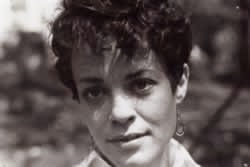 Melissa Green writes: I began my love affair with writing when I fell in love with novels following the breathless purchase I made at a church bazaar of a foxed, palm-sized copy of Daddy Long Legs. I was soon standing up on a hassock in the parlor to reach for my mother’s hardcover slipcased Sense & Sensibility, Pride & Prejudice, Jane Eyre, Wuthering Heights and Green Mansions. I adored them devotedly. But when I was given a two-volume set of Shakespeare’s Comedies and Tragedies-- incomplete, but delightful small paperbacks that were easy to hold, with winsome and dreamy line drawings of characters festooning the page at the beginning of each play, I was an complete turncoat and fell utterly in love with drama.
Melissa Green writes: I began my love affair with writing when I fell in love with novels following the breathless purchase I made at a church bazaar of a foxed, palm-sized copy of Daddy Long Legs. I was soon standing up on a hassock in the parlor to reach for my mother’s hardcover slipcased Sense & Sensibility, Pride & Prejudice, Jane Eyre, Wuthering Heights and Green Mansions. I adored them devotedly. But when I was given a two-volume set of Shakespeare’s Comedies and Tragedies-- incomplete, but delightful small paperbacks that were easy to hold, with winsome and dreamy line drawings of characters festooning the page at the beginning of each play, I was an complete turncoat and fell utterly in love with drama.The fundamentals of how one read a play were immediately apparent but Shakespeare’s language was in code, so beautiful when I whispered it aloud that I got chills, and so foreign, it might as well have been another tongue.
My mother explained that it was English, just an older form of it. I began with Twelfth Night and As You Like It. It was agonizing and exhilarating. I would read the play to the end, knowing I was missing most of it, and start all over and read it through again. Soon I could hear the voices in my ear and distinguish the struttings, the jokes, the romance, the tears. I remember all one summer being put to bed when it was still light and reading and reading to the sound of crickets and peepers, and I felt as though I were in the enchanted world of Titania, Oberon, Peaseblossom, Moth and Puck as the stars blinked open and the moon came up. Reading and rereading those two small but infinite volumes became my secret life, and the secret language of my secret life.
The big dictionary was in the little parlor in a bookcase behind the door to the kitchen. I began to look up words that baffled me in Shakespeare and then I fell in love again with discovering meanings in those and in words nearby. I was so starved, both physically hungry and emotionally ravenous, I began to inhale language in place of what I actually needed, and thought that words were chocolates and licorice all-sorts.
I suppose I should have grown up to be a playwright. My earliest writings were attempts at plays, and a novel I worked on with enormous pleasure before I was a teenager, but it was very difficult to finish anything. I needed guidance and there was none. I needed clues how to build a book and a play and I couldn’t read the instructions Shakespeare and Jane Austen gave me.
By the time I was in high school, I was able to finish plays and strong-arm my classmates into helping me put them on. I didn’t begin to understand the joy and complexities of reading poetry until my mid-teens.
1. The Linen Way vividly describes how, in the midst of much sadness in your life, your early poetry received the support, praise and encouragement of two great 20th century poets, Derek Walcott and Joseph Brodsky (and other great poets as well, such as Seamus Heaney). Do you feel that this support, and the success of your first collection, The Squanicook Eclogues , sustains you and your work still?
Joseph Brodsky died at the shocking young age of 55 in 1996. We lost Seamus Heaney at the end of August 2013. Derek Walcott, now in his 80s, is for the most part in a wheelchair in the Caribbean painting his lovely water colors. It’s been a great many years since any of them have literally been in my life, and yet the light on my bookshelves fills up the room for me with their continued presence.
I knew Seamus least well, but a he was so often in the company of Joseph and Derek, I absorbed his gentleness and humor over the course of years. Joseph was infinitely good to me--I can only guess at the ingenious ways by which he showed his loving support for me to the wider world without my knowing. Seamus wrote of Joseph in The New York Times shortly after his death, and I will borrow those words for which mine would be only a poor echo, “He was a verifying presence. His mixture of brilliance and sweetness, of the highest standards and the most refreshing common sense, never failed to be both fortifying and endearing.” Seamus wrote of ‘the intensity and boldness of his genius plus the sheer exhilaration of being in his company’. Joseph was such a beguiling and electrifying character, it was impossible once you had warmed your hands there to ever be without it.
Derek and I spent the most time together. We walked a great deal as we talked and he often took me for a meal. Though it’s been more than thirty years snce we were in each other’s company, I don’t think I’ve ever written a line of poetry without hearing the deep Caribbean music of his voice in my ear guiding my choice of language and metaphor. He championed me when I was very young. He considered me his peer, always, though that used to confuse me completely.
2. As someone who has studied Russian language and literature, I was intrigued to learn about the way you started learning Russian - and why and how you stopped. Have you ever gone back to the language, and are Russian poetry and Russian poets still important to you?
I am quite chagrined by my attempts to learn Russian, as a matter of fact.
I turned out to be surprisingly good at French, but the Cyrllics flummoxed me utterly, in the same way that I loved solving the puzzles of algebra and could not for the life of me comprehend the spatial relations in geometry. Joseph wrote a poem a Christmas time for many years and when it came time to translate the work that became his “Nativity Poems,” each poem was distributed to one of his friends for translation. I struggled and anguished over the shortest, only 10 lines, and I think my translation too longer by months than the many pages done by Derek or Glyn Maxwell. I gave up my study of Russian because clearly I didn’t have the gene for it.
But because of Joseph, I fell in love with and still read Osip Mandlestam, Marina Tsvetaeva and Anna Ahkmatova. They will always be important to me.
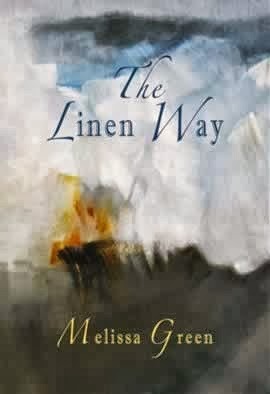
3. In The Linen Way , you mention both your fear of strangers (strongest during childhood, but still present) and your love of giving poetry readings. How does the act of reading poetry to an audience keep that fear at bay?
I still find it difficult to go to unfamiliar places or meet new people. I’ve never learned the subtle artlessness of small talk. I spend most of my life like an eremite, but if I do have to go out, I do much better with a companion, a Virgil to guide me through what often feels like the inferno of the world. Poetry readings give me fits in the abstract. As the date creeps closer, my anxiety level rises, and getting ready the hours before is its own hell, as I’m never sure if I’ll actually make it out the door without canceling at the last moment. Once I arrive at the podium, all that fear flies away and I somehow relax. Perhaps the poems act as a kind of scrim between myself and the audience. I usually find I love performing and discovered years ago that I am at ease in front of an audience, and am quite a good reader. It must be my inner ‘ham.’ It’s only afterwards when I have to talk to people again that gives me conniptions.
4. You say that Kathy Anderson at W. W. Norton taught you how to write prose during the course of completing your first memoir, Color Is the Suffering of Light . Are there other prose stylists, or teachers of prose, you particularly admire, and do you intend to do further prose writing?
Kathy Anderson, my editor at W. W. Norton and later my literary agent, was the most marvelous blend of writing teacher and artistic psychiatrist, and if I know anything at all about writing prose, I lay it at her feet. There are many writers whom I adore and you might never guess the profound effect they’ve had on my thinking and the lineaments of my prose, were I to name them here. I think it’s possible to live with certain writers you admire over many years without their influence readily showing itself.
I learned a great deal from Annie Dillard’s Pilgrim at Tinker Creek; from the New Yorker writers E. B. White and William Maxwell. There are writers it feels as if I’ve taken in intravenously and it may be nowhere apparent: the Danish short story writer, Isak Dinesen; Italo Calvino; the journals of Gerard Manley Hopkins and Dorothy Wordsworth; Hermann Broch’s The Death of Vergil; the Israeli novelist, David Grossman; the Canadian short story writer, Alice Munro; Graham Swift; Frederick Buechner; all of the works of Roberto Calasso and W. G. Sebald; the Canadian short story writer and Nobel Laureate, Alice Munro; the essayist Guy Davenport. I’m hoping to write a prose book about art but please don’t be looking for it any time soon!
5. In The Linen Way , you mention a poet to whom you have acted as a mentor, James Stotts. Would you be willing to say a little more about him, his work and this mentoring relationship?
I have my friend the photographer and poet Melissa Shook to thank for my first meeting James Stotts. About five years ago she emphatically insisted I attend a poetry reading with her but would say no more about why, only that there was a poet I had to hear. James Stotts was the 'warm-up' act for a well-known and beloved local poet who was to be followed by a lengthy open mike. I settled in for a long afternoon.
James was in his early 20s with a shock of bright red hair, and he did not read his poems but recited them, clearly, cleanly, with a powerful but natural gravitas. From the first line, I found myself holding my breath, afraid to move, blinking hard so as not to break into tears. I recognized in him what I had recognized in Derek so many years ago--the true voice of poetry. His style is not like Derek’s or my own. It wasn’t a similarity of narrative, metaphor or lexicon that captured me that day. I felt the way one does when you see an athlete, say a figure skater, perform a perfect routine, where the music, the poise, the genius of the body all work sublimely together, and when it’s over, you clap with a concussed kind of joy because you know you have seen something extraordinary.
After James finished reading, my head rang with his tales, his images. I didn’t hear a word of the local, well-known and beloved poet’s work, nor a single line from the writers who stood up one after the other to take the open mike. The applause at the end of the afternoon stirred me out of my daydream and I looked around, frantic that James would disappear before I had a chance to speak to him, to put my hand on his arm and ascertain he was real. I said to him, rather stupidly, almost expecting him to name another star, but really meaning how and where had he learned his magic, ‘James, where did you come from?’ He paused and said, rather flatly, “New Mexico.” We’ve been inseparable ever since, though he would have to be the one to tell you in just which ways I mentored him.
6. One of the advantages of ebooks is that they can include links to other material. The Linen Way includes, after the poem of the same name, a link to the 2007 Tribute to Melissa , introduced by Derek Walcott, in which 15 renowned poets read in your honour. Looking back six years on, what's your perspective on this tribute?
The Tribute was the brain child of friends and poets linked to the literary magazine AGNI and Arrowsmith Press, but which relied on the generosity of so many other people from the wider Boston poetic community, even now, six years on, I am astonished by how loved and held I was by so many people. It was part fund-raiser and part birthday party.
The poster advertising it read “A Sheaf for Melissa” and referred to each of twenty-five packets of beautiful rag paper and letterpress copies of poems donated by twenty-five Boston poets, each page autographed. The packets were sold to rare book collectors, rare book libraries and universities and the money raised was used to publish a limited-edition of my book of poems, Fifty-Two, and to hand me a check equivalent to a year’s salary. That was the first part of it. Then there was an evening’s celebration of me and my work, a wonderful and profoundly moving event: 15 poets spoke a little about me and read a poem of their own; then I read for 45 minutes from Fifty-Two. I could never have dreamt such a time for myself. My family was there, friends I hadn’t seen in very many years, poets whom I didn’t know personally but who knew my work, my students, even my doctors were there.
Six years later, I’m still astounded at the myriad gifts I was given that night. I was able to reacquaint myself with friends I’d fallen out of touch with, make new friendships with many people I met that night, and recognize ones I didn’t know I had: it’s as if all the doors and windows in my eremetic life had flown open. I was invited to give other readings, taught classes, established a kind of poetry soiree on Sunday afternoons that students and friends attend. My life is not empty any more. Even as far along as this year, a special friend from AGNI arranged a secret cabal who agreed to pay my rent for the foreseen future.
I never imagined such a rich social life for myself, but what was even more amazing was that the floodgates in my work opened. Pen & Anvil Press reprinted The Squanicook Eclogues; I finished a book of poems called Daphne in Mourning; I was able to complete a book about Héloïse and Abélard I’d been working on for years; I surprised myself by opening a blog which yielded my new memoir, The Linen Way, and one in which I posted new poems which eventually became The Marsh Poems; the nine poems in a major sequence called “The Mad Maud Poems”; and my affiliation with Ann Kjellberg’s literary journal Little Star. It’s been a remarkable six years.
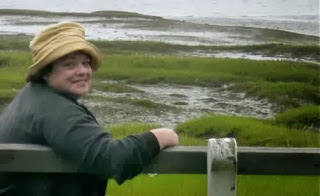
7. Perhaps, especially to readers in the US, it may come as a surprise that The Linen Way was published by a New Zealand publisher. Could you let readers of this blog know a little about how that came about?
I honestly don’t know how I had the courage or even the idea to begin a blog, but sometime during early 2010, I started ‘Vesper Sparrow’s Nest’ with no expectations, merely the thought that I might begin to explore some auto-biographical pieces in what I told myself was a way to ‘write a book in the air’. I could not have dreamt of all that would open to me from those tentative beginnings. I’ve met extraordinary people online and established some of the deepest, most abiding friendships imaginable, ones from which I will never be shaken.
Claire Beynon of Dunedin, New Zealand was one of my first readers, one of the miracles which nothing else in my life could have prepared me for. We were just getting to know each other when she and her friend and fellow-poet and Kiwi, Mary McCallum, talked of starting Tuesday Poem: people with blogs would be invited to join a community which would require they post a poem on their blog every Tuesday. I leapt at the chance to take part, never thinking its avowed purpose might have been to connect New Zealand and Australian poets, for instance--I just had to make a place for myself at that table! It was thrilling, and for the two years that I belonged, I was for most of that time able to write a new poem every week, which were gathered into a manuscript I called The Marsh Poems.
Claire has visited me in Boston for three years running, and in 2012 while we were visiting Emily Dickinson’s home in Amherst, she read The Linen Way, which I had recently finished, was terribly moved by it, and begged me to let her show it to Penelope Todd, her dear friend, the wonderful founder of Rosa Mira Books. Penelope loved it, and she was such a gift to me. I loved working with her, I couldn’t have asked for a more sensitive and intelligent editor, or be happier with how the e-book came out. I hope someday to visit all my kiwi friends.
8. Which poets, contemporary and otherwise, are you reading with particular enjoyment at the moment? Are there lesser-known poets whose work you recommend to readers of this blog?
I tend to read favorite poets for many years at a time, and feel I have yet to catch up to a lot of younger poets, to my dismay. Readers of my old blog may recognize in this current list the Usual Suspects: Czesław Miłosz, Zbigniew Herbert, Miklós Radnóti, Patrick Kavanagh, Geoffrey Hill, Paul Celan, Amy Clampitt and James Wright; some others I may not have mentioned are Charles Wright, Charles Simic, Rosanna Warren, George Kalogeris and Lucie Brock-Broido.
You can buy books by Tim Jones online! Voyagers: SF Poetry from NZ from Amazon.Transported (short story collection) from Fishpond or New Zealand Books Abroad.

Published on October 16, 2013 13:00
October 14, 2013
Tuesday Poem: Leda, Later - by Melissa Green
Remind me: my bed is empty,
my graying hair pinned up
and tumbling from a starfish clip
where once a waterfall by Crivelli flowed
over the white shoulders of Sparta.
I do not quarrel with my warring children.
Their bad marriages are their own affairs.
I sit on the rocks and watch the waves,
my toes now horny as a tortoise’s.
That night a storm came off the sea.
I saw St. Elmo’s fire electrify the spars
and a bluish current quivered on my skin.
I studied my egg-shaped oval in the glass,
breath like a wing beat in my throat,
wind tearing white curtains, my flesh,
and feathers on my bed in flight.
I am an old woman writing poetry.
I never wanted intimacy with goddesses
or gods, never wanted their dangerous progeny.
I only dreamt of passion, possession,
surrendering to the torque of human love.
Credit note: Previously published in Agni 77 and reproduced here by permission of the author.
Tim says: I'm delighted to have had the opportunity to interview the wonderful American poet Melissa Green, whose memoir The Linen Way has recently been published by Rosa Mira Books. This poem, so good in itself, is a little taste of what awaits in the interview!
The Tuesday Poem: Is Thoughts of the Father by Philip Salom, a fine Australian poet whose work I've recently encountered in the course of co-editing The Stars Like Sand.You can buy books by Tim Jones online! Voyagers: SF Poetry from NZ from Amazon.Transported (short story collection) from Fishpond or New Zealand Books Abroad.

Published on October 14, 2013 12:57
October 8, 2013
Northwrite 2013: Collaboration - Competition Now Open
It's collaboration time all round: Michelle Elvy and I are collaboratively judging the results of a collaborative writing competition! The competition is called Northwrite 2013, it's now open, entries close on 15 November 2013, and the competition guidelines and submission details are now online.
Be in - with a friend - to win!You can buy books by Tim Jones online! Voyagers: SF Poetry from NZ from Amazon.Transported (short story collection) from Fishpond or New Zealand Books Abroad.

Published on October 08, 2013 19:16
September 30, 2013
Tuesday Poem: New Year's resolution, by Saradha Koirala
Back on Earth we gauged the pressure, decided
it was not strong enough to turn carbon into
diamond rain but enough to incite change. We
took on new tasks, approached old jobs with
renewed determination. After all, we'd made it
around the sun again: a revolution to spark a
revolution. When we heard all the known matter
in the universe could fit into a grain of sand, we
took it in our stride; strode across sandy shores
anyway, trying not to do the maths. We had
been to Titan - a smog-covered moon - we
knew what we were getting ourselves into. We
laughed too loudly and cried out: If the distance
from the sun to Pluto is a ten cent piece then
the Milky Way is France!
Credit note: "New Year's resolution" is included in Saradha Koirala's latest poetry collection Tear Water Tea and is reproduced here by kind permission of the author.
Tim says: I recently finished Tear Water Tea and loved it - it's among my favourite poetry collections of the past few years. I very much admire the aptness and precision of the word choices Saradha makes in her poems: that was already evident in her first collection, Wit of the Staircase, and in her new collection it's coupled with a wider and more ambitious range of subject matter. Plus, the book's design is beautiful!
I previously interviewed Saradha, and used her poem A secret I don't mind you knowing as the Tuesday Poem on my blog that week.
There are lots of poems I could have requested from Saradha for this blog, but when I saw that she'd written a science fiction poem (well, she might not think of it as a science fiction poem, but I do!) I said "that's the one for me!". And, with Saradha's agreement, here it is.
The Tuesday Poem: Is hungry like the wolf.You can buy books by Tim Jones online! Voyagers: SF Poetry from NZ from Amazon.Transported (short story collection) from Fishpond or New Zealand Books Abroad.

Published on September 30, 2013 22:59
September 25, 2013
My September Book Watch Column from the Herald on Sunday
From time to time I contribute to the Herald on Sunday's Book Watch column, and my latest column is below. I write brief notes on four books I've written recently - the Herald usually chooses three of these to include in the column, and this time, they decided to leave out the review of Jane Kelsey's latest book about the Trans Pacific Partnership Agreement. But here are all four mini-reviews!
 Hidden Agendas: What We Need To Know About The TPPA
,
Hidden Agendas: What We Need To Know About The TPPA
,by Jane Kelsey - ebook - http://www.bwb.co.nz/books/hidden-agendas
The Trans Pacific Partnership Agreement
is currently under negotiation between the US and 9 other countries in the
Asia-Pacific region, including New Zealand. It has relatively little to do with
trade but a great deal to do with taking various aspects of the law of these
countries - covering such issues as investment policy, environment policy, and
intellectual property and copyright policy - outside the control of their
citizens and placing them under corporate control. I don't like that idea, and
NZ academic Jane Kelsey doesn’t either. This concise and readable study is a
good introduction to why we should all be concerned about the TPPA.
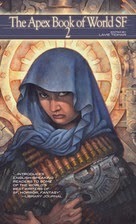 The Apex Book of World SF 2
,
The Apex Book of World SF 2
,ed. Lavie Tidhar - print and ebook - http://www.amazon.com/The-Apex-Book-World-SF/dp/193700905X/
Disclaimer: I have a story in this volume. I have not
considered it for the purposes of this review.
I enjoyed reading The Apex Book of
World SF 2 a lot. Rather than going for the usual Anglo-American
suspects, editor Lavie Tidhar has assembled an anthology of science fiction
stories from authors around the world, with South America, Europe and Asia
especially well represented. Like any anthology, there are some stories that
didn't grab me, but also a number I liked very much: my favourite was "The
Sound of Breaking Glass" by Joyce Chng of Singapore, a delicate and moving
story.
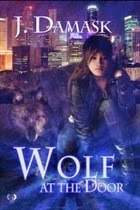 Wolf at the Door
, by J.
Wolf at the Door
, by J.Damask - print and ebook - http://www.amazon.com/Wolf-At-the-Door-ebook/dp/B004V51E0K/
Having enjoyed Joyce Chng’s story in The Apex Book
of World SF 2, I bought her novel Wolf at the Door,
written as J. Damask. This novel is about werewolves of Chinese descent living
in Singapore – and I enjoyed this one too. Its great strength is the way the
author interleaves the social dynamics of wolf pack and human family, as both
family members and outsiders threaten to disrupt the lives of the protagonist and
those near and dear to her. There are some flashbacks that didn’t work as well
for me, but that didn't detract from my enjoyment of the main story, which is
well characterised and well told.
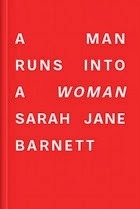 A Man Runs Into A Woman
, by Sarah
A Man Runs Into A Woman
, by SarahJane Barnett - print - http://hueandcry.org.nz/man_woman.html
Sarah Jane Barnett’s collection, which was shortlisted
for the 2013 New Zealand Post Book Awards, is notable both for its technical
excellence and for the breadth of the poems’ subject matter – from death row
inmates to pipeline workers. While I didn’t always connect with the subject
matter of these poems, the best poems here both moved and impressed me – such
as “Mountains”, selected for Best New Zealand Poems 2012, which I encourage you to read. Any lover of poetry should seek out
this book.
You can buy books by Tim Jones online! Voyagers: SF Poetry from NZ from Amazon.Transported (short story collection) from Fishpond or New Zealand Books Abroad.

Published on September 25, 2013 19:35
September 18, 2013
New Story In Fresh Fear Anthology
When horror writer and editor William Cook approached me a while back to ask if I'd be interested in submitting a horror story to his new anthology Fresh Fear: Contemporary Horror, I was unsure, because I hadn't written a horror story for a very long time - there are two in my first collection, Extreme Weather Events, but I hadn't written any since.
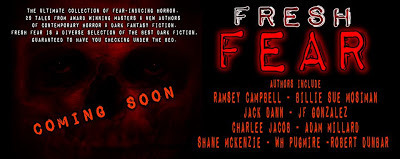
But I gave it a go, and I'm pleased to say that my story "Protein" was accepted for the anthology. You can check out the cover above and the enticing Table of Contents on William's blog. There are a number of writers there whose work I'm really looking forwards to reading!
You can buy books by Tim Jones online! Voyagers: SF Poetry from NZ from Amazon.Transported (short story collection) from Fishpond or New Zealand Books Abroad.

Published on September 18, 2013 14:51
September 9, 2013
Tuesday Poem: Summoning
Behind coded invitations,
long night journeys,
country house gatherings
of like-minded men -
behind the fear of women,
banishment of servants,
locked doors, shuttered windows,
guards to ward off spies -
behind cloaks, hoods,
symbols scrawled on vellum,
books of lore and learning,
circles of protection -
behind scrying-glass,
crystal, speculum,
the lighting of a candle
and the speaking of a name -
you never know.
That is the truth of every incantation.
You never know
what will come to the flame
Credit note: Published in Strange Horizons, February 13, 2006, and included in my second collection, All Blacks' Kitchen Gardens.
Tim says: When I wrote this poem, I had recently read John Crowley's novel The Solitudes (also published as Aegypt, but in fact the first volume of the Aegypt tetralogy), and it was inspired by the book's depiction of the 16th-century magicians and alchemists John Dee and Edward Kelley working, under conditions of great secrecy, to contact the angels and learn their secrets: explorers, but explorers of a particularly furtive kind. I went into excessive detail about the composition of this poem in a previous post.
The Tuesday Poem: Investigates the jar to see whether there is whisky in it.You can buy books by Tim Jones online! Voyagers: SF Poetry from NZ from Amazon.Transported (short story collection) from Fishpond or New Zealand Books Abroad.

Published on September 09, 2013 05:57



